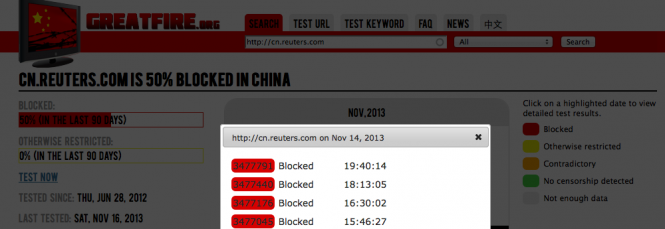Today we have decided to take the battle against online censorship in China to a new level.
On Friday, November 15, we broke the news that the websites for Reuters Chinese and Chinese Wall Street Journal were both blocked in China. Tests on our servers confirmed those blocks.

It appears that the block is related to the New York Times story published on November 14 concerning the relationship between JPMorgan Chase and Lily Chang (also known as Wen Ruchun), the daughter of former Chinese prime minister Wen Jiabao.
Reuters Chinese published news about the story on November 14, which is probably the reason the site was blocked.
In response to this block, we have just launched a mirror site for Reuters China, which is accessible here:
https://s3.amazonaws.com/cn.reuters/index.html
This website is accessible from within China without the use of any circumvention tools.
PLEASE NOTE: We have created this mirror website without seeking the approval of Reuters ahead of time. This mirror website was created without Reuters’ knowledge. If Reuters ask us to remove this website, we will do so immediately.
We have already used this method or mirroring for our own blocked website, FreeWeibo.com:
https://s3.amazonaws.com/freeweibo/index.html